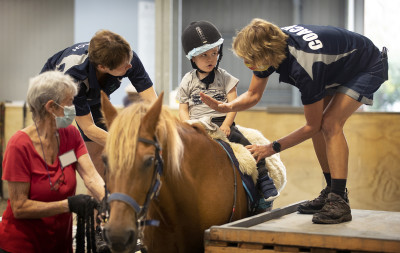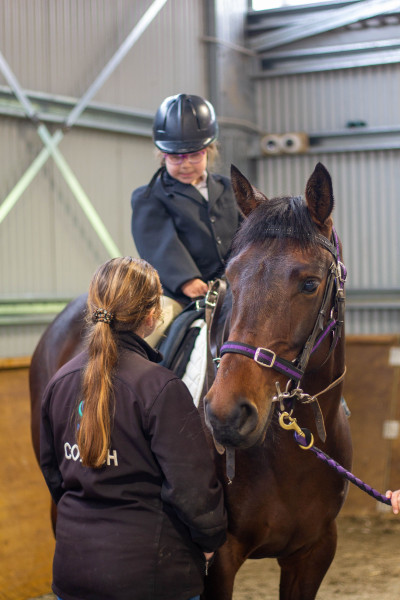Training helps change lives at Riding for the Disabled
8 September 2023
A new apprenticeship programme for coaches supporting New Zealand Riding for the Disabled (NZRDA) riders is attracting large numbers of learners and lifting the experience for disabled riders throughout the country.
 NZRDA provides life-changing opportunities to more than 3000 children and adults in communities around Aotearoa, by providing interaction with horses which improves health and wellbeing for those experiencing disability or who have specific challenges and needs.
NZRDA provides life-changing opportunities to more than 3000 children and adults in communities around Aotearoa, by providing interaction with horses which improves health and wellbeing for those experiencing disability or who have specific challenges and needs.
The organisation developed an apprenticeship qualification programme, and, with the support of Te Pūkenga | Primary ITO, the programme gained New Zealand Qualifications Authority approval in 2021.
Since then, more than 80 coaches and assistant coaches have undertaken training for the New Zealand Certificate in Equine Therapeutic Riding at Level 3 or 4, with 45 learners completing Level 3. Learners can combine Level 3 and 4 to complete the NZ Apprenticeship (Complex).
“It means we have a lot more coaches on the ground that are qualified and being well supported by their groups and NZRDA, and ultimately we are reaching more riders and changing more lives in line with our overall vision.”
The Level 3 covers a range of skills including understanding riders, adapting programmes, providing a safe environment, and supporting leaders and side walkers. The focus of Level 4 is on skills for a coach role and includes specialist skills for developing programmes and working with the wider RDA team.
“Interest has been strong, with the large uptake by assistant coaches and coaches also prompted by the Apprenticeship Boost programme, which enables RDA groups to pay coaches,” says Donna.
The training has had a positive effect on both riders and volunteers. “They have a qualified coach who understands the disability involved and can set a plan for each rider and feed that to others working with the riders.”
NZRDA also plans for the apprenticeship programme to benefit the wider equine industry with the coaches being able to support pony clubs and equestrian sports.
Te Pūkenga | Primary ITO Sector Manager Primary Services, Tanya Ingram, says NZRDA is providing a wonderful opportunity to its coaches and volunteers to achieve a recognised qualification. “With trained coaches they are able to provide a consistent standard of service throughout the country.”
The programme is delivered by NZRDA, with Te Pūkenga | Primary ITO providing moderation support and additional learning support to those with learning needs.
Find out more about NZRDA by visiting www.rda.org.nz
Learner Case Study
 Eastern Southland Riding for the Disabled (RDA) Coach Tracy Van der Straaten loves helping others, but never saw herself as leading the coaching of her local RDA group until she began training for an apprenticeship.
Eastern Southland Riding for the Disabled (RDA) Coach Tracy Van der Straaten loves helping others, but never saw herself as leading the coaching of her local RDA group until she began training for an apprenticeship.
Tracy has completed Level 3 of the New Zealand Apprenticeship in Equine Therapeutic Riding and is about to complete Level 4 and become a fully qualified coach.
Tracy has volunteered at Eastern Southland RDA for six years and was offered the opportunity to study toward the qualification. “I lack confidence, so I didn’t think coaching was something for me. Doing the qualification reaffirms that I can actually do it and that I have the skills for the job.”
A former early childhood teacher and teacher aide, Tracy says the learning has extended her knowledge. “What I like about it is that all the assessments that we do are relevant to my riders so I can put into practice what I am learning, and also that I can do the learning in my own time.”
Eastern Southland RDA caters for 42 riders at its weekly session.
Tracy says the opportunity for coaches to undertake recognised training has enhanced the experience for riders.
“They grow and develop skills here that they take into their daily lives. The training we are getting expands our ability to make a difference for them so that they are more confident both here and in the community.”
Tracy says she has enjoyed learning with other coaches who are training at the same time and the learning has also prompted relationship building and knowledge sharing with the neighbouring Southland RDA. “We are looking to build relationships, and this will help us do that, grow, and become more visible in the community.”
